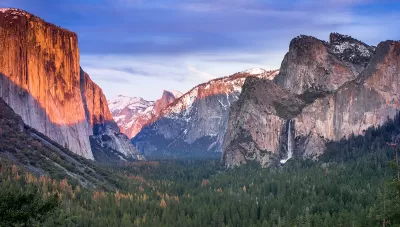The nation's only state-run cap-and-trade program survived a legal challenge by the California Chamber of Commerce and the libertarian Pacific Legal Foundation when a state court of appeal ruled 2-1 that the program doesn't amount to an illegal tax.

A new era in fighting climate change began in the U.S. on Nov. 14, 2012 when the California Air Resources Board launched the first state-run auction of carbon permits. One day earlier, the California Chamber of Commerce sued CARB over the legality of the program. "The Chamber believes that CARB can only impose regulatory fees on businesses," noted Planetizen at the time.
The first ruling came a year later by Sacramento Superior Court Judge Timothy Frawley who "ruled that the program does not constitute a tax, in part because the ‘license to emit’ does not come for free," reported Allie Goldstein for Ecosystem Marketplace. The ruling on April 6 by two of the three judges of the 3rd District Court of Appeal in Sacramento was along the same lines, reports Chris Megerian, who writes about climate change and California for the Los Angeles Times.
“It is not accurate to liken the auction system to payment for the privilege to stay in business in California,” they wrote Elena J. Duarte and M. Kathleen Butz. “It is a payment for the privilege to pollute the air in California.”
However, cap-and-trade is still in trouble. Carbon sales have remained low since May, and the program, authorized by the landmark Global Warming Solutions Act of 2006 (AB 32) is authorized only to year 2020. While SB 32, signed into law last September by Gov. Jerry Brown, extends the carbon reduction effort an additional decade, it did not include the cap-and-trade program.
Megerian reported in January that AB 151 had been introduced to extend the program. "Gov. Jerry Brown wants a supermajority vote in both houses of the Legislature to safeguard cap-and-trade from legal uncertainty."
Propositions 13 (1978) and 26 (2010) require that taxes and fees, respectively, be passed by the legislature by a two-thirds supermajority.
As for next steps for the current litigation, Megerian writes that "[i]t’s unclear whether the California Chamber of Commerce or the conservative Pacific Legal Foundation, both of which expressed disappointment Thursday, will appeal to the state [Supreme Court]."

Alabama: Trump Terminates Settlements for Black Communities Harmed By Raw Sewage
Trump deemed the landmark civil rights agreement “illegal DEI and environmental justice policy.”

Study: Maui’s Plan to Convert Vacation Rentals to Long-Term Housing Could Cause Nearly $1 Billion Economic Loss
The plan would reduce visitor accommodation by 25% resulting in 1,900 jobs lost.

Planetizen Federal Action Tracker
A weekly monitor of how Trump’s orders and actions are impacting planners and planning in America.

Federal Homelessness Agency Places Entire Staff on Leave
The U.S. Interagency Council on Homelessness is the only federal agency dedicated to preventing and ending homelessness.

Restoring Northern India’s Himalayan ‘Water Temples’
Thousands of centuries-old buildings protect the region’s natural springs and serve as community wells and gathering places.

Milwaukee to Double Bike Share Stations
Bublr Bikes, one of the nation’s most successful, will add 500 new e-bikes to its system.
Urban Design for Planners 1: Software Tools
This six-course series explores essential urban design concepts using open source software and equips planners with the tools they need to participate fully in the urban design process.
Planning for Universal Design
Learn the tools for implementing Universal Design in planning regulations.
Caltrans
Smith Gee Studio
Institute for Housing and Urban Development Studies (IHS)
City of Grandview
Harvard GSD Executive Education
Toledo-Lucas County Plan Commissions
Salt Lake City
NYU Wagner Graduate School of Public Service


























